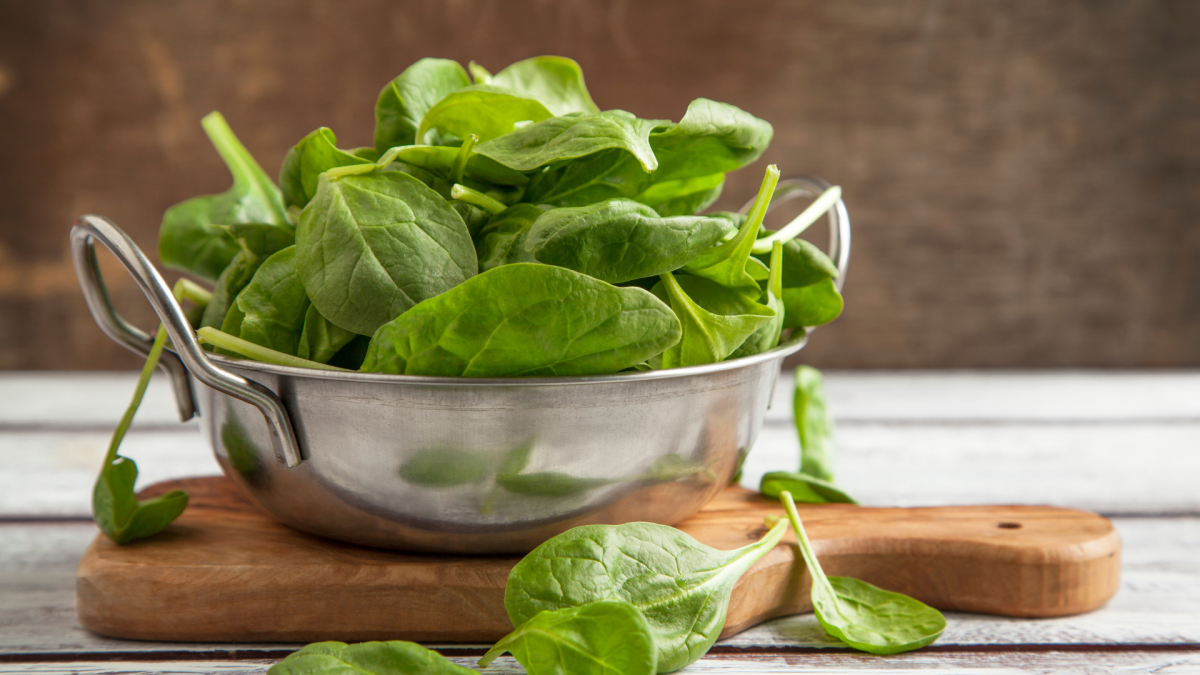Is spinach low FODMAP? Ultimate guide
- Low FODMAP diet
We know that spinach is abundant in many nutrients, but is spinach low FODMAP?
Sometimes, it can be hard to maintain a nutritionally complete diet when following a low FODMAP diet, so the more variety we can get, the better!
This post will discuss whether spinach is safe to eat on the low FODMAP diet, the health benefits of spinach and we will even provide you with some delicious recipes.

What is spinach?
Spinach is a leaf that originated in Persia around 2,000 years ago (1). You can use it in a variety of different dishes.
There are many variations of spinach, however, the main type consumed worldwide are (2):
- Flat-leaf spinach
- Baby spinach
Nutritional benefits of spinach
Spinach is seen to be beneficial in preventing cancer, obesity, high blood sugar, and high cholesterol (3).
This is due to spinach containing phytochemicals. Phytochemicals are biologically active compounds that are found in plants and help with their bodily functions (3, 4).
Spinach can also aid digestive functioning due to how the chlorophyll found within spinach interacts with the gut. A study found that the interactions between chlorophyll and gut microbiota increased the diversity of the gut microbiota (5).
As well as digestive functions spinach also contains fibre, vitamin A, vitamin C, vitamin K, vitamin E, total fatty acids, omega-3, iron, folate, and potassium (6, 7, 8, 9, 10).
Is spinach low FODMAP?
Yes, spinach is low FODMAP. However, you must take caution with portion sizes.
Spinach contains fructans (the ‘F’ in FODMAP). According to Monash university, it is only high in fructans when consumed in serving that it is no longer classified as low FODMAP (11, 12).
When consumed in small low FODMAP serving amounts it is safe for those on a low FODMAP diet.
According to Monash, regular English spinach contains no FODMAPs so it can be eaten in unlimited amounts (11). However, baby spinach contains fructans in larger portions so please check the Monash app for portion sizes (11).
Can spinach trigger IBS symptoms?
Spinach contains fructans, so if you are sensitive to fructans, then this could be a reason why spinach may aggravate your IBS symptoms. However, this should only happen if you are eating a large amount of spinach.
Spinach also contains fibre. If you suddenly increase your fibre intake, this may cause IBS symptoms such as gas and bloating while your gut adjusts to it.
If you are trying to increase your fibre intake, do this slowly over time to minimise symptoms and remember to increase your fluid intake too. Otherwise, you may become constipated.
People may also consume raw spinach which can be harder to digest. If you find that too many raw vegetables do not suit you, make sure to cook them before eating. You will still get the benefits and they will be easier to digest.
Click here to read more about how fibre affects IBS.
Low FODMAP spinach recipes
- Low FODMAP Creamed Spinach
- Low FODMAP Spinach and Coconut Soup
- Low FODMAP Spanakopita
- Low FODMAP Spinach, Feta and Pinenut Omlette
- Low FODMAP Ham, Cheese and Spinach Breakfast Muffin
- Low FODMAP Pasta with Prosciutto, Spinach and Peas
- Low FODMAP Spinach Salad with Strawberries
Summary
Spinach can be eaten on the low FODMAP diet but always check the Monash app for serving sizes. Regular English spinach contains no FODMAPs, but baby spinach is high in fructans in large amounts.
However, even during the restriction phase of the low FODMAP diet, you can reap all the benefits that spinach has to offer. There are many ways to add it to your diet in a variety of different recipes, as well as using it in salads.
If you do experience IBS symptoms after consuming spinach, remember that spinach does contain some fructans and fibre. Reduce the amount you are eating and monitor your symptoms.
Written by Maiya Bahra Student Dietitian, reviewed by Serena Bansal Registered Dietitian BSc Hons, and Kirsten Jackson Consultant Dietitian BSc Hons, RD, PG Cert